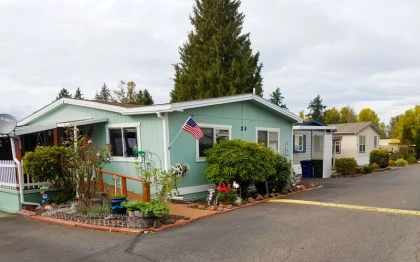
We helped 55 homeowners form a ROC in Centralia, Wash., last Friday. Our loan officer shared the seller’s heartwarming comment following the closing:
“It seems strange after 27 years to be finished but we are so happy for the residents. They control their future. It’s the most rewarding experience for us in our 40 years of owning these communities. Managing will be a new and challenging experience for them but with

ROC’s help, they’ll be just fine. It was great to work with you and we look forward to our paths crossing again in the future.”
Many of our colleagues in industry regard us as a different type of exit that clearly aligns with some operators.
One of my favorite sellers is George Everett, who sold his Kalispell, Mont., community to the homeowners in 2010. Mr. Everett is a Realtor who also served briefly in the Montana State Legislature where he won the most conservative voting record during his term. Our video interview with him is brief and excellent.
Homeowners stepping up and working in cooperation for long-term security and community betterment is inspiring people across the political spectrum. They’ve inspired me for 30 years, and counting!
No surprise, these communities attract journalists, as well. There were no fewer than 50 articles on ROCs in 2019 alone. Some focused exclusively on a co-op. Others find the issue through a problem in a privately owned community and raise up resident ownership as a growing solution.
When there is that type of comparison article, the coverage can both be fair and unfair at the same time.
The reality is that there are some very good private operators in the manufactured housing community business. Companies and investors who provide homeowners with a secure and decent value proposition are not too hard to find.
But media outlets tend to find and focus on the problems, and there are without doubt some not-so-good actors in the business.
My view is that they are exploiting the business model, and they’re giving the broader industry a black eye.
I was in the airport behind a fellow who was also returning from an industry event. We recognized each other but hadn’t met. I asked him what he did. He told me that he owned three “parks,” one which he was closing down now and two more he planned to close in three and four years.
Grinning, he said, “It’s a little tough to get through but the money is just too good to pass up.”
When he asked me what I did, his grin turned to a look of panic.
You see, the business model presents that opportunity to every private operator. The land owner can close the community and change its use virtually everywhere in the nation.
I read last week about an Indiana legislator who wants to double the notice period for closure – from 60 to 120 days. Our lowest income homeowners can be evicted – house and all – in 60 days. Does that even register as a homeowner protection? Rule-compliant, on-time with payments and evicted on 60 or 120 days’ notice doesn’t work, period.
The answer is resident ownership or for the good operators to band together and adopt a standardized lease that makes a long-term commitment to homebuyers. What if these were true Land Lease Communities that were secure?
Based upon our experience, industry could achieve three things through long-term leases:
1. Residential mortgage lenders – through actions by the GSEs – could be attracted to provide home-only mortgage loans in Land Lease Communities, creating an alternative to high-cost chattel loan products that provide liquidity to the “home in community” market today.
2. Long-term, fixed-rate conventional residential financing and the protections in a financeable leasehold interest would unleash unprecedented new development of Land Lease Communities. The sector has many advantages – lower cost production, high-density detached single-family neighborhood development, affordable, community living – that would be embraced by planners as a solution to the affordable housing crisis.
3. Land lease communities would shed the negative press of community closure, excessive rent increases and expensive housing financing – presenting a rebranding opportunity.
Whoever owns the land controls the future and because of that, resident ownership will long be the objective of many homeowner groups.
That said, hundreds of thousands of homeowners could enjoy great security and affordability were the industry to look hard at the fundamentals of the business model and reshape it through long-term leases and residential mortgage financing.
Lest you think we don’t know about bringing conventional residential mortgage lending into manufactured housing communities, consider this: The only manufactured housing communities in the U.S. in which Fannie Mae is buying home-only mortgages is in co-ops in New Hampshire based on work we did in 2007/8.
We stand ready to help bring such financing to ROCs across the country, and to true Land Lease Communities, too.
So, yes, resident ownership is a great exit strategy. More than that, ROC USA is also invested in helping factory-built manufactured housing become the affordable housing resource that it deserves to be. It just needs a little tweaking.
